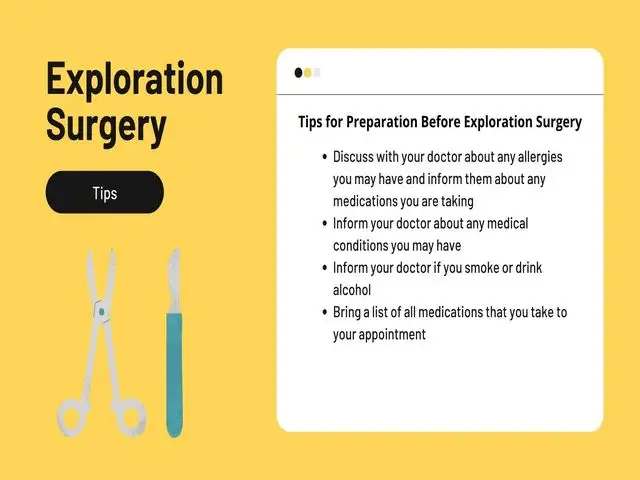The term exploration surgery is used to refer to a surgical procedure in which a surgeon will open up the patient’s body and look inside in order to diagnose the problem. Exploration surgery is a type of exploratory surgery, meaning that it is done without knowing what exactly the problem is. The surgeon will examine the organs and tissues inside of the body and use that information to determine what might be wrong with them.
Exploration Surgery can be used for diagnosis or for treatment purposes. Exploration surgery is used to:-diagnose a set of symptoms and determines what might be wrong with them-differentiate between two possible diseases or conditions-treat a patient who has cancer in which they will operate on the tumor, looking to remove it and/or prevent the spread of cancer to other parts of the body-remove a cyst that is causing problems and replace it with a healthier organ, such as the pancreas-repairing injuries or treating conditions like arthritis-help during pregnancy.

Tips for preparation before exploration surgery
Exploration surgery is a type of surgery that is used to find out the cause of pain. It can be performed on the spinal cord, brain, abdomen, or any other part of the body. The surgeon will explore the area by making an incision and removing some tissue from that area. This type of surgery is most often performed if there are no clear signs of what might be causing the pain.
The following are 5 tips for preparation before exploration surgery:
- Discuss with your doctor about any allergies you may have and inform them about any medications you are taking
- Inform your doctor about any medical conditions you may have
- Inform your doctor if you smoke or drink alcohol
- Bring a list of all medications that you take to your appointment
What are the Benefits of Exploration Surgery?
Exploration surgery is a type of surgery where the surgeon will go in and explore the body to find out what is wrong. This type of surgery may be necessary when there is something wrong with the internal organs or when they can’t find anything on an x-ray or MRI scan. Exploration Surgery has many benefits, including:
- It provides a diagnosis
- It can be used to treat certain conditions
- The risks are low
- It can be done with minimal incisions
- It saves time
What are the risks and side effects of Exploration Surgery?
Exploration surgery is a procedure that is often used to diagnose a medical condition. It can be an effective tool for doctors to find out the root cause of certain symptoms. However, there are some risks and side effects associated with this type of surgery. The following are six risks and side effects of exploration surgery:
- Infection
- Bleeding
- Nerve damage
- Scarring
- Need for additional surgeries
- Failure to find the cause
What are the alternatives to Exploration surgery?
The alternatives to Exploration surgery are:
Robot-assisted surgery: It is a minimally invasive technique that uses robotics, computer, and imaging technology to assist with surgical procedures.
Endoscopic surgery: It is a type of minimally invasive surgery that uses an endoscope, which is a long tube with a camera at the end. The surgeon inserts the tube through the patient’s mouth or abdomen.
Minimally invasive thoracic surgery: It is an operation where only small incisions are made in order to reach and remove diseased tissue in the chest.
How does the procedure work?
surgery exploration is a surgical procedure that is performed to find out the nature of the problem in a patient. This procedure is performed when there are no definite answers or diagnosis for the patient’s condition.
The exploration surgery procedure typically involves three steps:
1) A small incision is made on the skin overlying the area of concern,
2) The surgeon will then explore and examine the tissue, and
3) The surgeon will remove any tissue that may be causing an obstruction or inflammation.
What are the indications for exploration surgery?
The indications for exploration surgery are usually the same as those for non-exploration surgery.
There are some indications that suggest that a patient may need exploration surgery. These include:
- Difficulty breathing
- Fever
- Pain in the chest
- Nausea and vomiting
- A change in the character of bowel movements (bloody, black, or tarry)
- Blood in the urine or stool, or passing blood clots (hematemesis)
What are the complications of exploration surgery?
surgery exploration is a surgical procedure in which the surgeon looks inside the body cavity to diagnose or treat any problem that may be present.
In this procedure, the surgeon will make a cut in the skin of the abdomen and then use instruments to explore and diagnose. The complications can be:
- Infection
- Bleeding
- Damage to organs
What are some ways to reduce the risk of negative outcomes during this surgery?
It provides ways to reduce the risk of negative outcomes during exploratory of surgery.
- The first way is to use a surgical navigation system. The system will provide 3D images and show the surgeon where they need to go and what they need to do.
- The second way is to use a computer-assisted anesthesia system, which can help with the time it takes for anesthesia to take effect.
- The third way is using an intraoperative MRI machine, which can help with identifying tumors or other abnormalities in real time.
- The fourth way is using an intraoperative ultrasound machine, which can be used as a guide for surgeons as they perform delicate procedures such as brain surgery or kidney removal.
- The fifth way is using robotics systems that are designed for specific surgical tasks
How is exploration surgery different than laparotomy?
Exploration of surgery is a surgical procedure in which a surgeon makes an incision into the abdomen to view and explore the abdominal cavity. A laparotomy is a surgical procedure in which a surgeon makes an incision into the abdomen to examine or repair organs.
In exploration surgery, the surgeon can use cameras and other devices to see inside of the body without cutting through any organs. In laparotomy, surgeons often need to cut through organs in order to see what is happening inside of the body.

